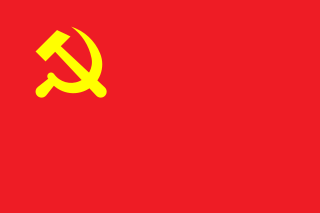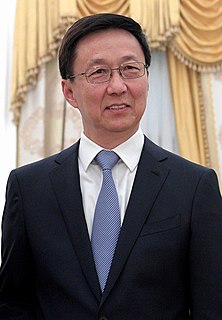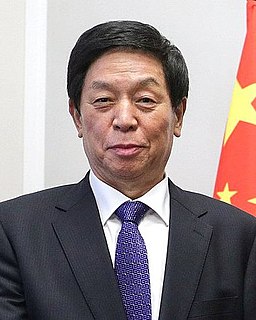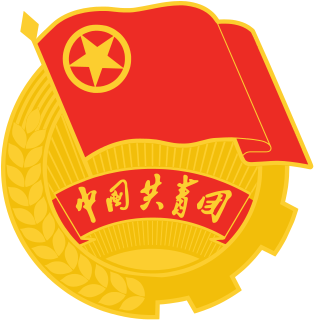Related Research Articles

The Chinese Communist Party (CCP), officially the Communist Party of China (CPC), is the founding and sole ruling party of the People's Republic of China (PRC). Under the leadership of Mao Zedong, the CCP emerged victorious in the Chinese Civil War against the Kuomintang, and in 1949 Mao proclaimed the establishment of the People's Republic of China. Since then, the CCP has governed China with eight smaller parties within its United Front, and has sole control over the People's Liberation Army (PLA). Each successive leader of the CCP has added their own theories to the party's constitution, which outlines the ideological beliefs of the party, collectively referred to as socialism with Chinese characteristics. As of 2022, the CCP has more than 96 million members, making it the second largest political party by party membership in the world after India's Bharatiya Janata Party. The Chinese public generally refer to the CCP as simply "the Party".

The Politburo of the Chinese Communist Party, formally known as the Political Bureau of the Communist Party of China Central Committee and known as the Central Bureau before 1927, is the decision-making body of the Chinese Communist Party (CCP). Currently, it is a group of 25 top officials who oversee the CCP and headed by the general secretary. Unlike politburos of other Communist parties, power within the Chinese politburo is further centralized in the Politburo Standing Committee, a group of 7 individuals from among the 25 top officials.

The general secretary of the Chinese Communist Party is the head of the Chinese Communist Party (CCP), the sole ruling party of the People's Republic of China (PRC). Since 1989, the CCP general secretary has been the paramount leader of the PRC.

The National Congress of the Chinese Communist Party is a party congress that is held every five years. The National Congress is theoretically the highest body within the Chinese Communist Party (CCP). Since 1987 the National Congress has been held in the months of October or November. The venue for the event, beginning in 1956, is the Great Hall of the People in Beijing. The Congress is the public venue for top-level leadership changes in the CCP and the formal event for changes to the Party's Constitution. In the past two decades the National Congress of the CCP has been pivotal at least as a symbolic part of leadership changes, and therefore has gained international media attention.

The Chairman of the Central Committee of the Chinese Communist Party was the leader of the Chinese Communist Party. The position was established at the 8th National Congress in 1945 and abolished at the 12th National Congress in 1982, being replaced by the general secretary. Offices with the name Chairman of the Central Executive Committee and Chairman of the Central Committee existed in 1922–1923 and 1928–1931, respectively.

Han Zheng is a Chinese politician serving as the Senior Vice Premier of the State Council and Politburo Standing Committee member of the Chinese Communist Party (CCP). He has also been leader of the Central Leading Group on Hong Kong and Macau Affairs since April 2018. Han served as Mayor of Shanghai between 2003 and 2012. In November 2012, he was promoted to become the Party Secretary of Shanghai, the top political post in the city, and also gained a seat on the CCP Politburo.

Li Zhanshu is a Chinese politician, and the current Chairman of the Standing Committee of the National People's Congress, the Chinese Speaker. He is a No.3 member of the Politburo Standing Committee of the Chinese Communist Party, China's top decision-making body.
Li Jiheng is a Chinese politician, who former served as Minister of Civil Affairs. He also is the former Communist Party Secretary of Inner Mongolia, the former Communist Party Chief and Governor of Yunnan province and a former Deputy Party Chief of Guangxi Zhuang Autonomous Region.

The Communist Youth League of China (CYLC), also known as the Young Communist League of China or simply the Communist Youth League (CYL), is a youth movement of the People's Republic of China for youth between the ages of 14 and 28, run by the Chinese Communist Party (CCP). The league is organized on the party pattern. Its leader is its First Secretary, who is an alternate member of the Central Committee of the CCP. The incumbent First Secretary is He Junke, appointed in June 2018. The Communist Youth League is also responsible for guiding the activities of the Young Pioneers.

The National People's Congress of the People's Republic of China, often referred to as the National People's Congress (NPC), is the highest organ of state power and the national legislature of the People's Republic of China. With 2,980 members in 2018, it is the largest legislative body in the world. The National People's Congress meets in full session for roughly two weeks each year and votes on important pieces of legislation and personnel assignments among other things, and due to the temporary nature of the plenary sessions, most of NPC's power is delegated to the Standing Committee of the National People's Congress (NPCSC), which consists of about 170 legislators and meets in continuous bi-monthly sessions, when its parent NPC is not in session.

The president of the People's Republic of China, commonly called the president of China, is the head of state of the People's Republic of China. The presidency is constitutionally a largely ceremonial office with very limited power in China's political system. However, since 1993, the post has been held by General Secretary of the Chinese Communist Party and Chairman of the Central Military Commission, the paramount leader of China.
The 19th National Congress of the Chinese Communist Party was held at the Great Hall of the People, Beijing, between 18 and 24 October 2017. 2,280 delegates represented the party's estimated 89 million members. Preparations for the 19th National Congress began in 2016 and ended with a plenary session of the Central Committee a few days prior to the Congress. In 2016, local and provincial party organizations began electing delegates to the congress as well as receiving and amending party documents. It was succeeded by the 20th National Congress of the Chinese Communist Party.

The 19th Central Committee of the Chinese Communist Party was elected by the 19th National Congress in 2017, and will sit until the next National Congress is convened in 2022. It formally succeeded the 18th Central Committee of the Chinese Communist Party.
The 19th Central Commission for Discipline Inspection of the Chinese Communist Party (CCP) was elected by the CCP's 19th National Congress on 24 October 2017, and its turn lasts until the convocation of the 20th National Congress in 2022. The CCDI is composed of 133 members. A member has voting rights. To be elected to the CCDI, a candidate must be a party member for at least five years.

The 20th National Congress of the Chinese Communist Party opened in Beijing on 16 October 2022. The CCP Congress will endorse the membership list of the Central Commission for Discipline Inspection and will elect the 20th Central Committee. The day after the closing of the Congress, the 1st Plenary Session will be held at which the Central Committee will approve the membership of the CCP's Politburo and its Standing Committee, the party's most powerful decision-making body.
Li Yumei is a Chinese politician who served as chairwoman of the Standing Committee of the Guangdong Provincial People's Congress from 2017 to 2022.
Cheng Andong is a Chinese politician who served as governor of Shaanxi from 1994 to 2002. He spent 10 years working at Gaokeng Coal Mine in Pingxiang before serving in various administrative and political roles in Pingxiang Mining Bureau. He joined the Chinese Communist Party (CCP) in June 1980.
Gu Jinchi was a Chinese Communist politician who served as party secretary of Gansu from 1990 to 1993 and party secretary of Liaoning.
The Presidium of the 20th National Congress of the Chinese Communist Party was elected by congress delegates in a preparatory meeting before the convening of the congress. The Presidium of the 20th National Congress leads the organisation and the agenda of the aforementioned congress.
The Qualification Review Committee of the 20th National Congress of the Chinese Communist Party was elected by congress delegates in a preparatory meeting before the convening of the congress.
References
- 1 2 "八大主席团名单(共六十三人)" [List of the Eight Presidiums (63 members in total)]. People's Daily . Archived from the original on 15 October 2022. Retrieved 21 October 2022.
